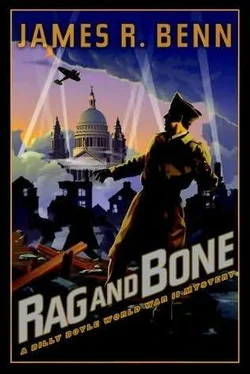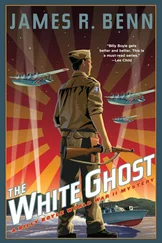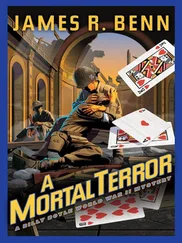James Benn - Rag and Bone
Здесь есть возможность читать онлайн «James Benn - Rag and Bone» весь текст электронной книги совершенно бесплатно (целиком полную версию без сокращений). В некоторых случаях можно слушать аудио, скачать через торрент в формате fb2 и присутствует краткое содержание. Жанр: Шпионский детектив, на английском языке. Описание произведения, (предисловие) а так же отзывы посетителей доступны на портале библиотеки ЛибКат.
- Название:Rag and Bone
- Автор:
- Жанр:
- Год:неизвестен
- ISBN:нет данных
- Рейтинг книги:4 / 5. Голосов: 1
-
Избранное:Добавить в избранное
- Отзывы:
-
Ваша оценка:
- 80
- 1
- 2
- 3
- 4
- 5
Rag and Bone: краткое содержание, описание и аннотация
Предлагаем к чтению аннотацию, описание, краткое содержание или предисловие (зависит от того, что написал сам автор книги «Rag and Bone»). Если вы не нашли необходимую информацию о книге — напишите в комментариях, мы постараемся отыскать её.
Rag and Bone — читать онлайн бесплатно полную книгу (весь текст) целиком
Ниже представлен текст книги, разбитый по страницам. Система сохранения места последней прочитанной страницы, позволяет с удобством читать онлайн бесплатно книгу «Rag and Bone», без необходимости каждый раз заново искать на чём Вы остановились. Поставьте закладку, и сможете в любой момент перейти на страницу, на которой закончили чтение.
Интервал:
Закладка:
“Look at this,” Radecki said, handing me a memo on the stationery of His Majesty’s Government. It was from Anthony Eden, British foreign secretary, to Winston Churchill, on the Katyn revelations. One line stood out:
His Majesty’s Government have used their best efforts not to allow these German maneuvers to have even the semblance of success.
“What does that mean?” I asked.
“The best efforts of a government in peril often bring out the worst they are capable of,” Radecki said as he took the memo back. “It means that the British will never reveal that the Russians were responsible for the executions. It is not in their interest.”
“How did you get this letter?”
“Remember, London is a city of spies.”
“I will,” I said, looking Radecki in the eye, and wondering if he went out armed, and what caliber his weapon was. “Do you think the American government will listen to you if the British won’t?”
“We hope so. We hear that General Eisenhower is a fair man.”
“Major Horak,” I said, appealing to the ranking officer present. “If there is one thing the general values above all, it is Allied unity. Fair or not, I don’t see him risking that, no matter how strong your evidence. You could argue it was all circumstantial. A clever plot by the Nazis to divide the Allies. There are no living witnesses, except Russians.”
“That is not quite the case, Lieutenant Boyle. There is someone we would like you to meet.” He nodded, and Radecki and Kaz left the room. “There is a witness. Lieutenant Kazimierz will bring him in. It is best if Captain Radecki is not present. He may make him somewhat nervous.”
“Why?”
“The ordeal has been difficult, and he would prefer to not speak of it. Radecki had rather insisted, and the poor fellow suffered a setback, so we kept them apart for a while. Then we tried again, and their relationship improved greatly, but still, there is no need for a crowd. Our guest does have a nervous disposition. Ah, here they are!” The door opened, and Kaz entered the room with a young man. Kaz had his arm around him, and I wasn’t sure if it was to keep him from falling over or running away. His eyes flitted around the room, as if he was searching for an unknown threat. Kaz whispered something to him and he relaxed as they drew nearer.
“Tad, this is my friend, the American I told you about. Billy, this is Tadeusz Tucholski.”
“Glad to meet you,” I said, standing and extending my hand. Tadeusz flinched.
“It’s all right,” Horak said in a calming voice. “We are all good friends here.”
“Yes, yes, sir,” Tadeusz said. “Sorry.” He and Kaz sat on the couch together. Tadeusz was dressed in the same uniform with the Poland shoulder patch, but he wore no indication of rank or other insignia. He looked maybe twenty, but it was hard to tell. His face was thin and pale, and his dark eyes seemed to bulge out of their sockets. He rubbed his hands together, rubbed them on his pants, then together again. He studied them for a minute, and then spoke without moving his eyes off them.
“They want me to tell you, to tell you what I saw. I don’t want to, but I will. I know it is important.” The words came out in a rush, the rapidity of his speech at odds with the stillness of his body.
“If you want to,” I said. “Do you want some coffee?”
“Coffee?” He sounded like it was the oddest question he’d ever heard. “Yes, please.” I poured a cup from the silver coffee service and put it down in front of him. I filled my cup and held it, wisps of steam drifting above it. I took a sip, and it was still warm.
“I was a cadet,” Tadeusz began. “When the Russians came, I was a cadet, in training to become an officer, you understand? In a special school for cadets.”
“Yes, I understand,” I said. He spoke English well, though with a heavy accent.
“They took us prisoner. It was terrible. At first, they put all of us in the basement of a building. They left us there for three days. No food, no bathroom. A little water, nothing else. Do you understand?”
“Yes.”
“Good. Three days, over one hundred cadets. In a dark basement. Do you understand?” He took the cup and saucer in his hands. They trembled, and the china made a clattering, clinking sound as he spilled coffee into the saucer. Kaz took it from him gently and touched his arm.
“Then we spent two days and two nights in railcars. There was bread and water. It was bad, but not as bad as the basement. There was fresh air, and we had something to eat. Do you understand?” He raised his voice, the question insistent.
“Yes, I do. It wasn’t as bad.”
“No, and then they marched us to the camp. There were showers, and barracks. Soup for dinner. We thought the worst of it was over. They let us write home. They questioned us, each of us, alone. They seemed to know a great deal about us, what our parents did, what youth groups we belonged to. There were many rumors, always about going to Romania. They were going to send us there any day. But that day never came.”
“What happened next?” Kaz prompted him.
“They came for me one morning. I thought it would be more of the same. More questions about school, the other cadets, and about Marxism. They wanted us to believe in Marx and Stalin, but no one listened. I thought it was going to be more of the same. But they beat me. A big NKVD sergeant, he started beating me while an officer sat in a chair and watched. No one said anything. Then they threw me out into the snow.
The next day, they came for me again. This time the officer sat at a table. He had a confession for me to sign. It was in Russian, and he told me it was my confession about spying for the Germans.”
“But you were just a kid,” I said.
“They said my father was a spy. He had been to Berlin, for business meetings. He was an architect, so it was normal for him to travel. I tried to explain, but they said we were all spies, all capitalists, my father, mother, and little sister, we were all enemies of the people. He told me my father had confessed, and showed me a piece of paper with his signature. It was his, I recognized it. I knew they had forced him, I knew he was not a spy, not an enemy of anyone. He was an architect, do you understand?”
“Yes.”
“Good. They told me it was important for you to understand. I wouldn’t talk about it otherwise. It’s too painful.”
“You don’t have to, you know.”
“Yes, I must, it is my duty. I did not sign. They told me they would be lenient with my mother and sister if I signed. But I was smarter than that. I knew that if my mother and sister had confessed, they would have shown me their signatures. But they hadn’t. They beat me. They put me in solitary confinement. But I didn’t sign.”
“Good for you.”
“Perhaps, but I am not sure. One day the officer who interrogated me was gone. They stopped coming for me. Spring came, and then one day they announced we would be leaving the camp. Romania, we thought. Finally. They took us out in small groups, marching out the main gate, everyone in good spirits. The most senior officers went first. I was in one of the last groups. We marched to a train. NKVD guards stood along the road and prodded us with bayonets, forcing us into railcars, like the ones that had brought us to the camp. It was springtime, but it was cold, very cold. We wore everything we owned.” Tadeusz shivered and rubbed his hands together. “Someone realized we were not traveling south toward Romania. I didn’t know what to think. The train stopped and they had buses and trucks back right up to the cars. They shoved us in, packed us in tight, so we almost couldn’t breathe. When the truck finally stopped, they hauled us out and tied our hands behind our backs. No one knew what was going on, and the guards cursed at us, kicked us, hit men with their rifle butts. They marched us into the woods, on a muddy road, still screaming at us to hurry, hurry. I began to hear popping noises, like firecrackers, lots of firecrackers. The noise would start up and then stop, start and stop. More guards came, with pistols in their hands. One had blood on his sleeve. I was scared, but there was no time to do anything, nowhere to go, it was all shouts and pop pop pop, I couldn’t think. There were NKVD officers standing around with clipboards and lists of names. They took a group of ten men in front of me and pushed them up and over a hill. I heard the shots, and then they came for us, bayonets sticking into our backs. They were calling us Polish pigs, telling us to hurry, hurry, or they’d shoot us right there. I fell at the top of the hill when I saw what was there. A huge pit, and it was full of bodies. I remember thinking it was astounding that so many of us had run to our deaths like that. I saw four men kneeling and a Russian walk behind them, bang, bang, bang, bang, and they all tumbled into the pit. There were men in the pit- Russian prisoners, they looked like, not Poles-stacking the bodies. One row of heads in one direction, the next row feet in that direction. It was so unbelievable that I was no longer afraid. I sat on the ground while madness went on around me. I don’t know why they left me there, although it was only a minute or so. I saw men pushed up the hill, saw pistols being reloaded, saw more bodies fall. It was mechanical, like a killing factory, except we were in the woods, on a beautiful, clear spring day. I see every moment of that minute, over and over again, every day. Every hour. Every night. Do you understand?”
Читать дальшеИнтервал:
Закладка:
Похожие книги на «Rag and Bone»
Представляем Вашему вниманию похожие книги на «Rag and Bone» списком для выбора. Мы отобрали схожую по названию и смыслу литературу в надежде предоставить читателям больше вариантов отыскать новые, интересные, ещё непрочитанные произведения.
Обсуждение, отзывы о книге «Rag and Bone» и просто собственные мнения читателей. Оставьте ваши комментарии, напишите, что Вы думаете о произведении, его смысле или главных героях. Укажите что конкретно понравилось, а что нет, и почему Вы так считаете.












